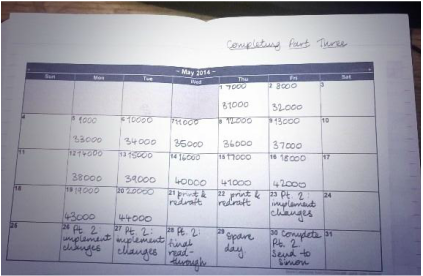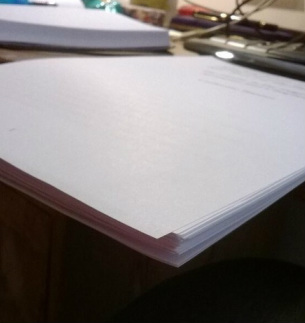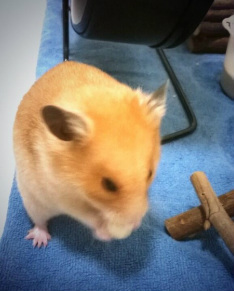In an entry from 1926, Woolf reflects on her possible future readers:
But what is to become of all these diaries, I asked myself yesterday. If I died, what would Leo make of them? He would be disinclined to burn them; he could not publish them. Well, he should make up a book from them, I think; and then burn the body. I daresay there is a little book in them; if the scraps and scratching were straightened out a little.
This was exactly what her husband, Leonard, did in order to make A Writer's Diary. The entries Leonard chose are primarily those that deal with some aspect of Virginia Woolf's craft as a writer, not with her personal life. But inevitably, a sense of Woolf and of the person she must have been comes through on every page. Here, for example, she writes about the ups and downs of Mrs Dalloway:
Wednesday, August 29th
I've been battling for ever so long with The Hours [working title], which is proving one of my most tantalising and refractory of books. Parts are so bad, parts so good; I'm much interested; can't stop making it up yet - yet. What is the matter with it?
Saturday, December 13th
I can write and write and write now: the happiest feeling in the world.
There are so many fascinating details within the pages. She notes, for example, the dates on which her books were begun and finished, how much she earned and how many copies were sold - as well as the critical reception each received from her friends and from critics. These parts of the book can become intense to take part in as a reader, as Woolf veers between elation and despair, one day resolving to write only what she believes in, another day buoyed or deflated by a favourable or negative review. But Woolf's uncomfortable honesty is also, I believe, what allows her to examine her own writing processes with such a fine eye. She spends a lot of time taking her own temperature as a writer. For example, in these entries from 1920 about the process of writing Jacob's Room:
I write Jacob every morning now, feeling each day's work like a fence which I have to ride at, my heart in my mouth till it's over, and I've cleared, or knocked the bar out.
It is worth mentioning, for future reference, that the creative power which bubbles so pleasantly in beginning a new book quiets down after a time, and one goes on more steadily. Doubts creep in. Then one becomes resigned... I want to write nothing in this book that I don't enjoy writing. Yet writing is always difficult.
Or here, describing her rewriting process:
I am now galloping over Mrs Dalloway, re-typing it entirely from the start, a good method, I believe, as thus one works with a wet brush over the whole, and joins parts separately composed and gone dry.
Though the selections in A Writer's Diary are about the creative process, it would have been impossible for Leonard to make a clear cut between these and the parts dealing with Woolf's inner life, since her life and her work were so inevitably bound up in each other. For this reason, the book is coloured by her struggles with depression and the sometimes grim personal losses and political upheavals to which Woolf bore witness. The parts which deal with the Second World War are raw and difficult to read:
Wednesday, September 6th
Our first air raid warning at 8:30 this morning. A warbling that gradually insinuates itself as I lay in bed. So dressed and walked on the terrace with L. Sky clear. All cottages shut. Breakfast. All clear. During the interval a raid on Southwark. No news. The Hepworths came on Monday. Rather like a sea voyage. Forced conversation. Boredom. All meaning has run out of anything. Scarcely worth reading papers. The B.B.C. gives any news the day before. Emptiness. Inefficiency. I may as well record these things.
But though the book deals with depression, the book in itself is not depressing. In fact, what is so striking is that despair and elation seemed to fight within Woolf in equal measure, until the very end. When life appears to her precarious, fragile or undercut with darkness, she strives to overcome this feeling. So even at her bleakest moments, she can be in the next instant buoyed by her love for life, her wonder, her sense of possibility. This was what Leonard Woolf believed might have happened again had she lived to see the end of the war and a more hopeful future. As such, the book is not a portrait of a bleak individual, but of a passionate soul, always searching and striving in spite of the darkness which occasionally threatened to overwhelm her:
I enjoy almost everything. Yet I have some restless searcher in me. Why is there not a discovery in life? Something one can lay hands on and say, "This is it"? My depression is a harassed feeling. I'm looking: but that's not it - that's not it. What is it? And shall I die before I find it? Then (as I was walking through Russell Square last night) I see the mountains in the sky: the great clouds; and the moon which is risen over Persia; I have a great and astonishing sense of something there, which is "it." It is not exactly beauty that I mean. It is that the thing is in itself enough: satisfactory; achieved.



 RSS Feed
RSS Feed
